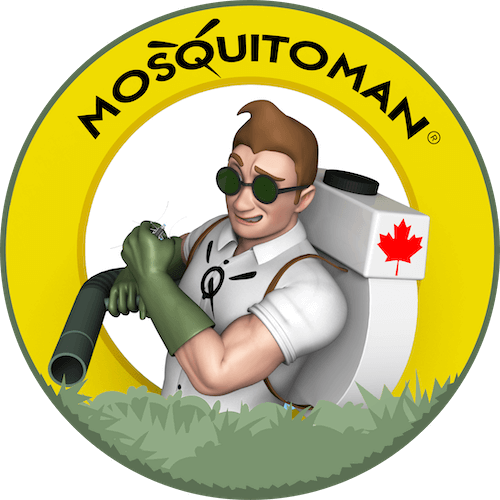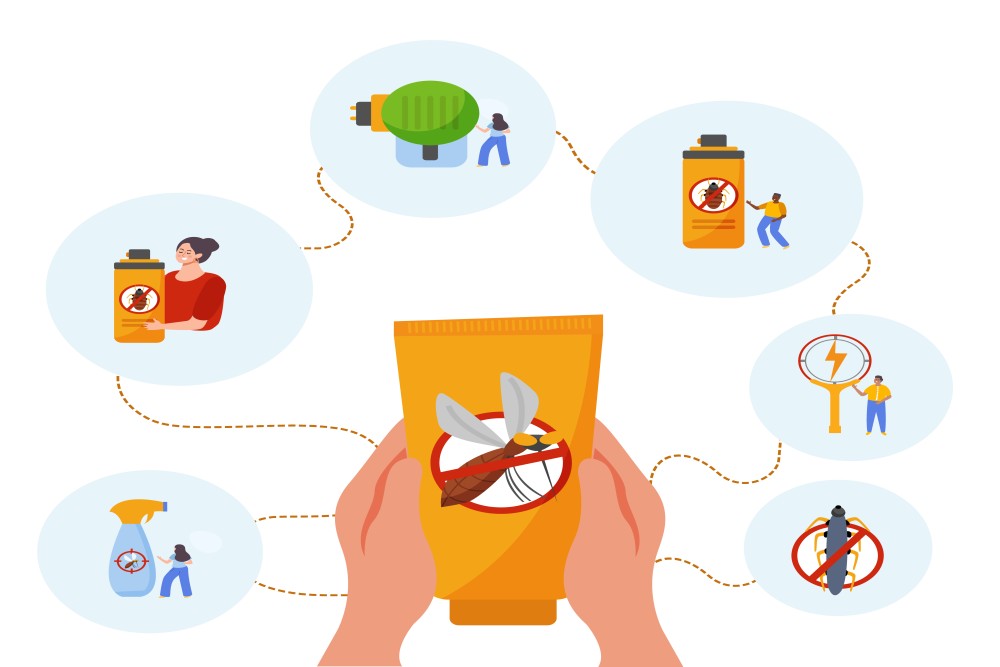Stay protected against mosquito-borne diseases with effective mosquito prevention strategies, natural insect repellents, and essential gear. Mosquito Man offers expert mosquito control tips to help you reduce mosquito habitats and ensure safe outdoor activities.
Understanding Mosquito Prevention
Mosquito prevention is crucial to keep public health safe from mosquito-borne diseases. To prevent these, insect repellents should be used, mosquito control measures should be followed, and public health advice from the government of Canada and the US EPA should be heeded.
Learn more: Signs of a Mosquito Infestation: How to Identify and Control the Problem
Methods for Effective Mosquito Control
How do mosquito repellents work?
Insect repellents help by hiding the scents that attract mosquitoes. Some common ingredients are DEET, picaridin, lemon eucalyptus oil, citronella, soybean oil, methyl nonyl ketone, and IR3535. These ingredients form a barrier on your skin or clothes, stopping mosquitoes from biting. Natural options, like essential oils, also work but may need more frequent applications.
What active ingredients are essential in mosquito sprays?
Effective mosquito sprays have key active ingredients. DEET and picaridin are known for their effectiveness. Others like lemon eucalyptus oil and IR3535 are also popular. We can’t be saying this as permethrin is a regulated insecticide in Canada and must ONLY be used according to the permitted uses outlined on the product label. Biopesticides, made from natural materials, offer an eco-friendly choice. Knowing these ingredients helps you pick the right spray for mosquito prevention.
Health Risks and Mosquitoes
How can you protect children from mosquito bites?
Children need special care to avoid mosquito bites. Pediatricians suggest using child-safe repellents and dressing kids in protective clothing. Mosquito netting and bed nets give extra protection, especially in areas with many mosquitoes. Treating mosquito bites quickly can help prevent infections and keep kids comfortable and safe.
By following these tips, you can greatly lower your chances of getting bitten by mosquitoes and stay healthy.
Practical Tips for Mosquito Prevention
Using Natural Repellents
Natural repellents can help keep mosquitoes away. Essential oils like citronella, lemon eucalyptus, tea tree oil, neem oil, lavender, and thyme are known for their mosquito-repelling properties. Health Canada also approves certain biopesticides and natural mosquito repellents for safe use.
Are natural mosquito repellents effective?
Natural insect repellents, including those with citronella, lemon eucalyptus, tea tree oil, and neem oil, can be useful against mosquitoes. These essential oils come in sprays and candles. Citronella candles are especially popular for outdoor use. Natural options may work, but they might need to be reapplied more often than synthetic ones.
Which essential oils can repel mosquitoes?
Several essential oils can effectively repel mosquitoes. The most common are citronella, lemon eucalyptus, tea tree oil, neem oil, lavender, thyme, and geraniol. These oils can be diluted and applied to the skin or used in diffusers, sprays, and candles. Many people use citronella candles and sprays, while garlic is known for its strong smell that repels mosquitoes.
Preventing Mosquito Breeding
Eliminating Standing Water
Mosquitoes breed in standing water where they lay their eggs, leading to more mosquitoes around. To stop this, get rid of any stagnant water near your home. Check for clogged gutters, flower pots, and bird baths. Empty or clean them often. This breaks up mosquito habitats and reduces the larvae that turn into mosquitoes.
Why is standing water a breeding ground for mosquitoes?
Standing water is perfect for mosquitoes to lay their eggs. The still water lets mosquito larvae grow, feeding on bacteria and organic stuff in the water. Knowing the mosquito life cycle helps us see why we need to remove these breeding spots to keep populations down.
How can you remove standing water around your home?
Look for places around your house that collect water after it rains or when you water plants. Make sure rainwater tanks are sealed tight, fix leaks, and clean out gutters regularly. Fill in any low spots in your yard where water gathers. Doing these things helps keep mosquitoes from finding good breeding spots.
Outdoor and Indoor Mosquito Control
To control mosquitoes, use methods both outside and inside. Outside, use insect sprays, traps, and natural repellents. Inside, use mosquito nets, window screens, and indoor traps. Combining these methods helps keep mosquitoes away both inside and out.
What are the best outdoor mosquito control methods?
For outdoor mosquito control, use repellents and traps. Biopesticides and natural methods like planting mosquito-repelling plants also work. Use mosquito foggers and larvicides to target larvae and reduce adult mosquito numbers over time.
How can you prevent mosquitoes inside your house?
Use insect repellent and put mosquito nets over beds to keep mosquitoes out. Make sure window screens are in good shape. Consider using indoor mosquito traps. Check for and eliminate indoor breeding sites like potted plant saucers and pet water dishes to maintain a mosquito-free home.
Choosing the Right Products for Mosquito Prevention
Types of Mosquito Traps
Mosquito traps are great for managing mosquitoes. Various kinds exist, each serving different needs. Common types include mosquito zappers, mosquito magnets, and CO2 traps. Mosquito zappers use UV light to attract and kill mosquitoes. Mosquito magnets use propane to create CO2, mimicking human breath to trap mosquitoes. These traps are helpful for both indoor and outdoor mosquito control, reducing mosquito numbers in specific areas.
How do different mosquito traps work?
Different mosquito traps work in unique ways to lure and kill mosquitoes. Mosquito zappers use ultraviolet light to attract mosquitoes and then electrocute them. CO2 traps, like mosquito magnets, emit carbon dioxide to mimic human breath, drawing mosquitoes in and trapping them. Some traps also use heat and moisture as additional lures. Each type has its strengths, making them suitable for various environments and levels of infestation.
Are mosquito zappers effective?
Mosquito zappers can work well in some conditions. They perform best in controlled indoor areas or small outdoor spaces. However, they might attract many other insects besides mosquitoes. For larger outdoor areas, combining multiple mosquito control methods might be more effective. This includes integrated pest management strategies to get better results.
Evaluating Insect Sprays and Larvicides
Insect sprays and larvicides play crucial roles in preventing mosquitoes. Insect sprays usually have active ingredients like DEET and permethrin, which repel mosquitoes. Larvicides target mosquito larvae, stopping them from becoming biting adults. These methods are essential for managing mosquito populations and lowering the risk of mosquito-borne diseases.
What should you look for in an insect spray?
When picking an insect spray, check the active ingredients and their concentration. DEET and permethrin work well and provide long-lasting protection. Natural insect repellents, like oil of lemon eucalyptus, can be good for those wanting chemical-free options. Ensure the spray suits your needs, whether it’s for skin, clothing, or outdoor use.
How do larvicides help in controlling mosquito populations?
Larvicides target the early stages of the mosquito lifecycle. By using larvicides in standing water where mosquitoes breed, these products stop larvae from growing into adults. This method reduces mosquito populations at their source. Environment-friendly choices include biological agents like Bacillus thuringiensis israelensis (Bti), which only target mosquito larvae without harming other wildlife.
Learn more about these methods by visiting our detailed guide on mosquito prevention.
Mosquito Prevention for Special Situations
Travel and Mosquito Prevention
How can you prevent mosquito bites while traveling?
When you’re traveling, it’s essential to prevent mosquito bites to avoid diseases. Use insect repellent that has DEET for strong protection. Personal repellents work too, and should be put on exposed skin. Wearing long sleeves and pants helps keep mosquitoes away. If you prefer natural options, essential oil repellents are available.
For sleeping, use mosquito nets, especially in areas with many mosquitoes. Nets with insecticide give more safety. Never sleep outdoors without proper cover as it raises the risk of bites. If bitten, anti-mosquito lotions can treat and soothe the bites.
What precautions should be taken in mosquito-prone areas?
In places with a high risk of diseases like malaria, dengue fever, and Zika, take extra care. Make sure your lodgings are mosquito-proof. Use bed nets or stay in well-screened or air-conditioned rooms. Outdoor mosquito control measures, like mosquito coils and plugins, are also helpful.
Know when local mosquitoes are most active, usually dawn and dusk. Stay inside during these times or use strong repellents if you have to be outside. Understanding the risks and taking proper steps can help prevent bites effectively.
Protecting Pets from Mosquitoes
How can you protect your pets from mosquito bites?
To protect your pets, use pet-safe mosquito repellents. Check with veterinarians to ensure these products are safe and effective. Implement mosquito control in outdoor areas where pets play. Bed nets in pet sleeping areas also help.
Natural mosquito repellents, like essential oils, can be used but ensure they are pet-safe. Regularly check pets for ticks and bites. Keep their environment clean to reduce mosquito breeding grounds.
Are mosquito repellents safe for pets?
Not all mosquito repellents are safe for pets. Repellents meant for humans, especially those with DEET, can harm pets. Use products specifically designed for animals. Natural repellents might be safer, but always check with a veterinarian. Using pet-safe products helps protect pets without side effects.
Mosquito Prevention – Key Insights
- Implement effective mosquito strategies and go beyond basic insect prevention methods to ensure the prevention of mosquitoes around your home.
- Utilize proven mosquito removal techniques and explore solutions to protect against mosquito-related illnesses.
- Invest in prevention measures like mosquito and misting systems to reduce the mosquito population and enhance safety.
- Use environment-friendly methods such as citronella candles and DEET mosquito repellent as part of your prevention methods.
- Consider personal insect repellents, including wearable options and anti-mosquito lotion, for protection during travel.
- Join local mosquito abatement programs to help reduce breeding sites and ensure community safety.
- Use mosquito dunks and zappers to achieve comprehensive protection in outdoor areas.
- Address mosquito bite treatment promptly with itch relief products and use shields and magnets for illness prevention.
- Follow guidelines from healthcare professionals for mosquito prevention during pregnancy and for infants.
- Incorporate natural methods like cinnamon-based solutions and specific fabrics that mosquitoes avoid.
- Learn about different species of mosquitoes and use pesticides responsibly to control them without harming other arthropods.





